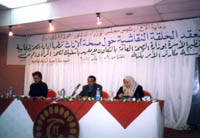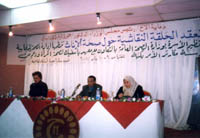
Workshop on (FGM) Female Circumcision& Womens Health Workshop [Archives:2001/03/Health]
January 15 2001
Nadia Al Saqqaf
Yemen Times

General Background on FGM:
Female circumcision, widely known as female genital mutilation (FGM), is a term used for a variety of surgical operations carried out on female genitalia. These operations are practiced on healthy female children for traditional reasons backed by great social pressure. The operations may lead to immediate health risks and, sometimes to long term health damage. The practice of female circumcision is prevalent in parts of Africa and the Near East. In Yemen, it is believed to be limited to certain areas in coastal areas. In many cases, this phenomenon leads to the defamation of muliebria.
Studies and demographic surveys, Yemen, in 1991 revealed that 23% of women, responding to the study, acceded to FGM, especially in Taiz 24%, Aden 28%, Hodeidah 80%, Hadramout 90% and Mahrah 98% governorates. The survey revealed that 1263 women respondents have heard of the practice.
K A P study & Results:
Not much information has been collected about FGM and about the effects that might occur as a result of this social phenomenon in a country like Yemen. A study was conducted, during 1-17. 8. 1999, to find ways to end this terrible practice, and improving healthy delivery. Objectives of K A P study were to collect information on the kind of operation made during female circumcision, competence of those who carried out operations, instruments and materials used, female circumcised sexual complications and side-effects, scholars vantage point, respondents attitudes and finally FGM relation to education levels. Questionnaire of 600 forms were distributed in governorates as follows: Aden 200, Hadramout 200, Hodeidah 200. Forms were distributed to mothers who had at least one circumcised daughter.
The study reveals that 87% of those who carried out the procedure are not the medical personnel. 40% of them were Rayssah meaning a woman who usually performs this procedure, 34% were done by Dayah meaning midwives, 2% by male nurses, 9.2% by hospital attendants 12.5% by medical personnel and 3.3% were carried out by doctors.
The study also showed the kind of instruments being used when carrying out female circumcision; razor (50.5%), scissors (39.5%), lancet (3%), knife (0.2%). Those who do not know about the instrument used are 6.6%. The same study indicates that 80.6% of women targeted by the study approve of the continuation of the circumcision. The reasons cited for this are multiple among which are cleanness (25.5%), good tradition (8.5%), keeping the virginity of girls (3%) and cleanness and limiting the sexual desire (8.1%).
14.2% respondents supported the discontinuation of the process viewing it as a suppression against females (3.1%), away from religion (1.6%) and bad tradition (3%).
According to educational levels, the process of FGM is much spread among illiterate women with 54% in contrast to 12.5% in case of literate ones. The percentage of those who have only joined the primary education constituted 20.2%, those in the secondary education (11.7%), those in institutes (1%) and those in universities (0.5%).
FGM Health Complications:
The study reveals a vital issue pertaining to health complications associated with female circumcision. Respondents and tests could reveal multiple and many medical complications, immediate and long term. Bleeding, on the top of the list with 73%, is unavoidable since damage to the blood vessels is inevitable. Shock from the loss of blood and pain since the operation is performed without anesthetic cover invariably occur to some degree with 7.9%. Bleeding, puss and bleeding accompanied by fever have the same proportion each with 4.5% out of 88 sick females due to this practice. Fever is spread in 2.3%. Strong pain and alginuresis have the proportion of 2.3%. A percentage of 2.3% was reported as death cases as a result of circumcision, pains with 1.1% and tumor with 1.1%. Infection is also a common complication due to unhygienic conditions in which the operation is performed.
Female circumcision was widely condemned in the World Population Conference and World Women Conference. It was also condemned in a joint report published by the WHO, UNICEF and UNPF as a violation of womens rights.
In the workshop, an overview on FGM meaning female circumcision in many countries including Yemen was covered. The key findings of the KAP study on FGM in the selected areas: Aden, Hodeidah, Hadramout, were discussed. The role of the NGOs, MOPH, other Ministries, Institutions, channels of Information, Education and communication in raising health awareness in FGM also came up for discussion.
OPHTHALMIC EDUCATION (22)
——
[archive-e:03-v:2001-y:2001-d:2001-01-15-p:./2001/iss03/health.htm]


